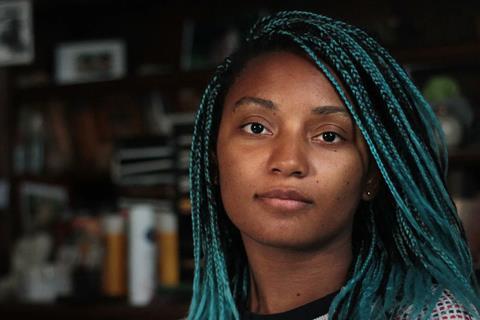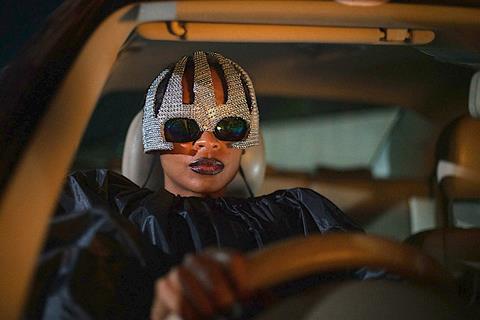
Zambian-Welsh director Rungano Nyoni is back on the Croisette with her new feature On Becoming A Guinea Fowl, which is showing in Un Certain Regard.
She has a long association with the festival. Her debut feature I Am Not A Witch screened in the Quinzaine in 2017 having been written at the Cannes Résidence. It went on to win a BAFTA for outstanding debut in 2018. She was also on the Cannes Competition jury in 2023.
Nyoni’s new movie is a surrealistic drama set in Zambia, dealing with grief and sexual abuse. Screen critic Wendy Ide described it as “a formally daring picture that blends fantasy, stylised drama and elements of black comedy to explore the societal pressures that rewrite the truth”.
On Becoming A Guinea Fowl was produced by Element Pictures, BBC Film, Fremantle and A24, with sales being handled by A24.
After the success of I Am Not A Witch, was it a challenge to make a second feature when everyone had such high expectations?
It’s a burden I have to say. I don’t put that pressure on myself. It actually came externally. At one point we were having discussions and I had an out-of-body experience where people said, “Is this a Rungano Nyoni film?” I was like, “But I am Rungano Nyoni.” I realise I had already been branded in a certain way and I found that really odd because I don’t brand myself. I am still discovering. It’s my second film. I wanted this to be small, just as small as the other one, to relieve that pressure. I didn’t want to do a big studio film or anything with a much bigger budget. I just wanted to keep it small and so I could find myself.
Your new film has a very dark undertow and yet it has been described in certain quarters as a comedy.
I always have issues with tone in my films. That might be left over from what it was previously meant to be. The intention was that it was meant to be more absurd. It’s still absurd but less leaning in on the comedy. That felt a bit inappropriate at times. Yes, it gets very dark.
Could this be called a MeToo film, or is it one about grief?
It might have been brought about by grief. I had lost two people very close to me in Zambia who I loved very deeply. That took a bit of a toll. I wrote it right after the funeral of my grandmother. It is a little bit about grief. In Zambian culture, they don’t believe you are born a bad person, they believe that circumstances make you bad. They’re a little bit more forgiving. I think [the film] is closer to MeToo and I thought that was what people would categorise it as – it talks about sexual abuse and how women are treated in that environment.
You’re from a family of strong women but your film shows some very cruel treatment of the female characters, especially the widow.
The funny thing about Zambian culture is that we are matriarchal but there are so many contradictions. Why do we have the same issues of misogyny in this environment?
How did you end up working with Oscar-winning Irish production outfit Element Pictures on this project?
I had a meeting with Ed [Guiney, CEO of Element]. I had found the experience of I Am Not A Witch quite an… experience. That’s a polite way of saying it. I was coming off the back of that. I said, “I don’t want it to be the same way.” It was a difficult shoot. I’ll save it for a book one day. He was patiently listening, taking it in. I remembered him because he was really calm and together. When I wrote this script, he was the only one I sent it to. He met me in Lisbon because I live in Lisbon. He’s so easygoing and I like his disposition. Both Ed and [Element co-CEO] Andrew [Lowe] are so calm. You wonder how they built this empire.
You did your first film with Film4. You worked on this one with BBC Film. How do you find working with the UK broadcasters? They’re known to like to have a say in projects.
It comes with the territory [but] I find it difficult. Some people can flourish with it. I find it is a tough thing. I think I haven’t found the sweet spot yet. It’s public money and I guess they have to see that a film comes out of it. I think [that’s] because I have had experience with the CNC. That’s also public money in France and I just never met anyone from CNC. It’s a very different experience. It’s hard to get the money, you have to go through jury panels. But once you get it, they pretty much leave you alone. I am quite candid with the financiers, the broadcasters. I say, “I find you tough, I find it a bit unnatural.” I do welcome notes… but I welcome notes on my terms. And I can’t get that. Sometimes it feels you’re working the other way – you’re working for the broadcasters. I just found it tough but they’re probably frustrated with me as well.

Is the character of Shula in the film an alter ego for you?
My grandmother was called Shula. She was so legendary in how she lived her life, very forward thinking, very independent, very stubborn. I was originally going to be called Shula. They called me Rungano which is pretty good too. Shula is a version of me and other people in my family who have a similar constitution. But I think this one is the closest to me. Her family is a bit more bourgeois than mine but there is this idea of her living between two worlds. People thought I was trying to find someone who looked like me [to play her] but I really wasn’t. It was just a strange coincidence but she [Susan Chardy] was the best person for this role. She did an audition over Zoom and she was perfect.
How have your relatives reacted to your success and how do you think they will react to a film that shows some disturbing aspects of family life?
My family is always supportive. They understand that whatever I do is an expression. This is drama. Drama is showing negative things. I am from a long line of women in my family who’ve achieved greater things than me and with more grace. I am nothing special. But they are my biggest supporters. They’re always involved in my films by the way. In the making and production, they’re the fixers, making sure things are done. The film industry in Zambia is growing but we still don’t have a lot of infrastructure. The older you are, the more respect you command. I usually send my aunts to do things for me.

























No comments yet